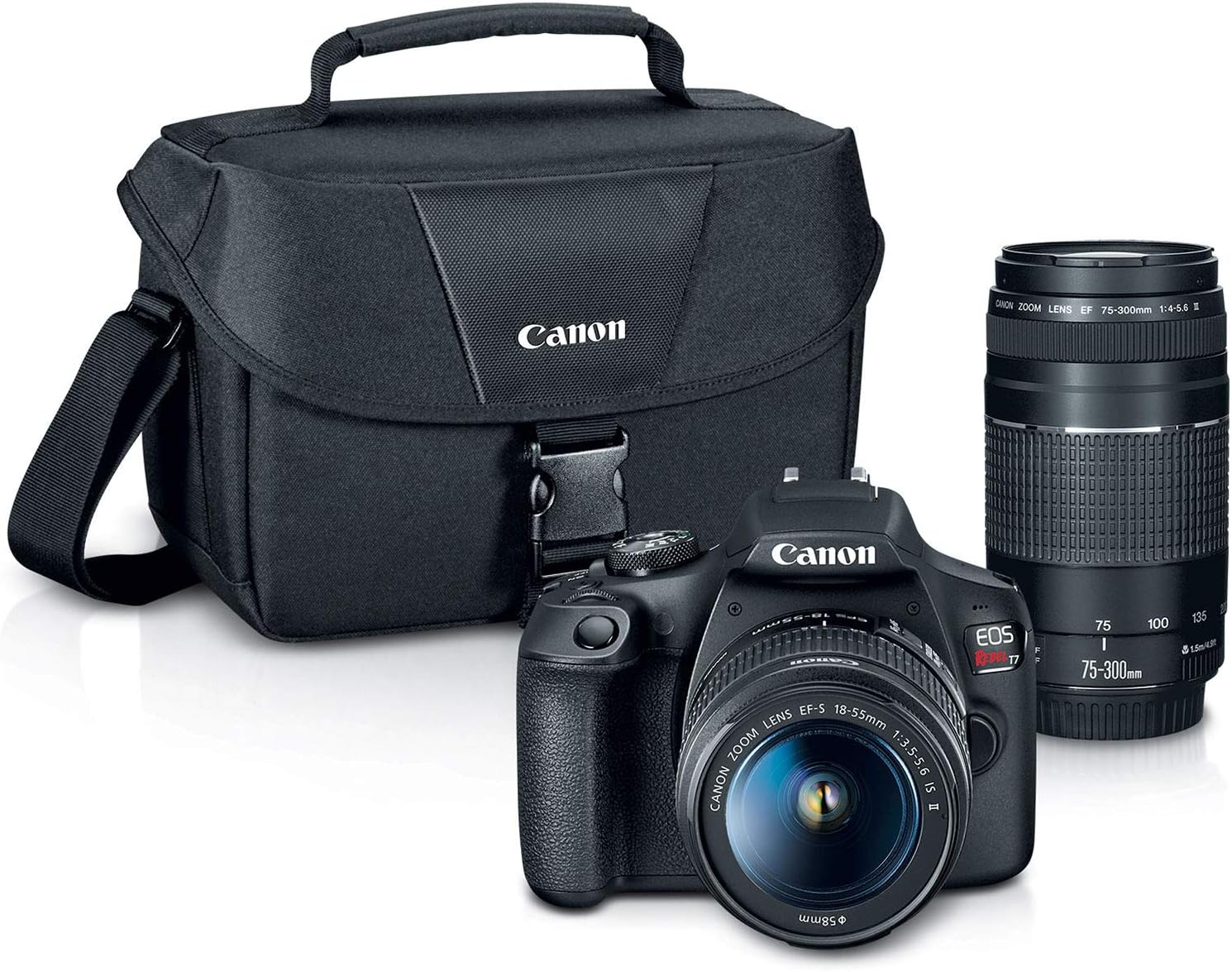Here’s an overview of the Best Camera For Sports Photography that we’ll explore today:
Sports photography demands a camera that can handle fast action, dynamic lighting, and long shooting sessions. With so many options on the market, choosing the right one can be daunting. In this review, we evaluated five cameras ranging from budget-friendly models to premium bundles, focusing on their performance, feature sets, and overall value. Our testing methodology included assessing autofocus precision, burst shooting speeds, image stabilization, and low-light performance. Whether you’re a beginner or an enthusiast, this guide will help you find the best camera for your sports photography needs.
1. Canon EOS Rebel T7 DSLR Camera|2 Lens Kit with EF18-55mm + EF 75-300mm Lens
- Brand: Canon
- Manufacturer: Canon
The Canon EOS Rebel T7 is a versatile DSLR camera equipped with a 24.1 MP APS-C CMOS sensor and a dual-lens kit (18-55mm and 75-300mm). It offers Full HD 1080p video recording, a 9-point autofocus system, and built-in Wi-Fi for seamless sharing. This camera is ideal for beginners looking to explore sports photography without overwhelming complexity. The inclusion of two lenses adds flexibility for capturing wide-angle and telephoto shots.
In testing, the T7 performed well in bright conditions, producing sharp, vibrant images. However, its 3 fps continuous shooting speed is limiting for high-speed sports. The 9-point autofocus system is reliable but struggles with fast-moving subjects compared to higher-end models. The optical viewfinder provides a clear, real-time view, but the lack of 4K video and advanced stabilization may be a drawback for video-focused users. Overall, it’s a solid entry-level option for amateurs.
Pros
- Dual-lens kit for versatile shooting
- High-quality 24.1 MP sensor
- Built-in Wi-Fi for easy sharing
Cons
- Slow 3 fps burst shooting speed
- Limited low-light autofocus performance
2. Canon EOS Rebel T7 DSLR Camera Bundle w/ Canon EF-S 18-55mm f/3.5-5.6 is II Lens + 2pc SanDisk 64GB Memory Cards
- Brand: Canon
- Manufacturer: Canon
This premium Canon bundle includes the EOS Rebel T7 DSLR camera, an 18-55mm lens, and a comprehensive accessory kit with two 64GB memory cards, a tripod, and additional lenses. Its 24.1 MP sensor and DIGIC 4+ processor deliver excellent image quality with low noise. The bundle is designed for those who want an all-in-one package to start shooting immediately.
The accessory kit adds significant value, especially for beginners. The included wide-angle and telephoto lenses expand creative possibilities, while the tripod and filters enhance shooting stability and versatility. However, like the standalone T7, its 3 fps burst speed and 9-point autofocus limit its performance for fast-paced sports. This bundle is best suited for users who want a complete setup for general photography, including sports.
Pros
- Comprehensive accessory kit
- High-quality 24.1 MP sensor
- Great value for beginners
Cons
- Limited burst shooting performance
- Bulky and less portable
3. 8K Digital Cameras for Photography – Autofocus 88MP WiFi Vlogging Camera for YouTube with Dual-Lens – 16X Digital Zoom Vlog Camera with Lens Hood
- Brand: XNSIAKXA
- Manufacturer: XNSIAKXA
The XNSIAKXA 8K Digital Camera is a compact and lightweight option featuring an 88 MP sensor, 8K video recording, and dual lenses for added versatility. With built-in Wi-Fi, a 3.2-inch touch screen, and 16x digital zoom, it’s designed for content creators and casual photographers.
While the 88 MP resolution is impressive on paper, the small 1/4-inch sensor limits its real-world performance, particularly in low light. The autofocus is adequate for static subjects but struggles with fast-moving sports action. The 16x digital zoom is convenient but sacrifices image quality. This camera is best for beginners focused on vlogging or casual photography rather than dedicated sports use.
Pros
- Ultra-high 88 MP resolution
- 8K video recording capability
- Compact and lightweight design
Cons
- Limited low-light performance
- Digital zoom reduces image quality
4. 8K Digital Camera for Photography
- Brand: Fulealfly
- Manufacturer: Fulealfly
The Fulealfly 8K Digital Camera offers an 88 MP sensor, 8K video recording, and dual-lens functionality. It includes features like 6-axis stabilization, Wi-Fi, and a 3.2-inch touch screen. The camera is marketed as a budget-friendly option for both photography and vlogging.
Despite its high-resolution sensor, the Fulealfly struggles with autofocus speed and accuracy in dynamic sports scenarios. The 6-axis stabilization is effective for handheld video but less so for fast action. While it’s a good choice for beginners or hobbyists on a budget, its performance falls short for demanding sports photography applications.
Pros
- Affordable price point
- 8K video and 88 MP stills
- Effective 6-axis stabilization
Cons
- Slow autofocus for moving subjects
- Limited dynamic range
5. 8K Digital Camera
- Brand: YOODEE
- Manufacturer: YOODEE
The YOODEE 8K Digital Camera combines an 88 MP sensor with 8K video, dual lenses, and a 16x digital zoom. It features Wi-Fi connectivity, HDMI output, and a 3.2-inch touch screen, making it a versatile tool for travel and casual use.
The YOODEE camera excels in user-friendliness, with intuitive controls and a compact design. However, its performance in sports photography is hindered by slow autofocus and the limitations of its digital zoom. It’s a solid choice for beginners or casual users but lacks the advanced features needed for professional sports photography.
Pros
- High-resolution 88 MP sensor
- 8K video capability
- Compact and travel-friendly design
Cons
- Digital zoom compromises image quality
- Subpar autofocus for fast action
Frequently Asked Questions
We’ve compiled answers to the most common questions about camera for sports photographys to help you make an informed decision.
Conclusion
.
Ultimately, the Canon EOS Rebel T7 stands out as the best overall option for those new to sports photography, while the 8K digital cameras are better suited for casual or creative use.
Evaluate your priorities—whether it’s resolution, portability, or versatility—before making your decision..





